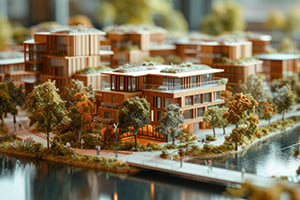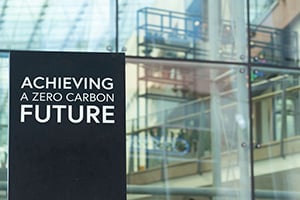By Libby Dunne
Sustainability Analyst
Sustainable Investment Group (SIG)

The current COVID-19 viral outbreak is currently forcing lifestyle changes that create difficulty and hardship for many people. However, this virus will likely bring about some permanent changes that may help to prevent or at least better prepare us for an outbreak in the future. Some of these changes are already reflected in various credits in building certification programs such as LEED, WELL, and Fitwel. This list represents a few building design components, compiled from various sources as well as some original ideas, that have the potential to stop the spread of disease and allow tenants to be better prepared for another outbreak. Each component on this list is also tied to at least one credit from one or more building certification program:
 Enhanced HVAC ventilation systems: Bringing air into a building from outside can help to dilute any airborne particles that may be in the air. Increased ventilation can help with this. LEED IEQc1.3 Increased Ventilation, WELL A03: Ventilation Effectiveness, and WELL A05: Enhanced Ventilation all focus on having proper ventilation for this purpose. Additionally, having operable windows can allow tenants to let in air from the outdoors themselves, relating to WELL A07: Operable Windows. However, if letting in air from the outdoors is not feasible (too cold, too hot, poor air quality), filtration or air purifiers can help to eliminate airborne particles indoors. LEED IEQc1.4 and WELL A12: Air Filtration focus on having proper filtration media to filter air. LEED, WELL, and Fitwel all have credits associated with regular monitoring and reporting of indoor air quality metrics.
Enhanced HVAC ventilation systems: Bringing air into a building from outside can help to dilute any airborne particles that may be in the air. Increased ventilation can help with this. LEED IEQc1.3 Increased Ventilation, WELL A03: Ventilation Effectiveness, and WELL A05: Enhanced Ventilation all focus on having proper ventilation for this purpose. Additionally, having operable windows can allow tenants to let in air from the outdoors themselves, relating to WELL A07: Operable Windows. However, if letting in air from the outdoors is not feasible (too cold, too hot, poor air quality), filtration or air purifiers can help to eliminate airborne particles indoors. LEED IEQc1.4 and WELL A12: Air Filtration focus on having proper filtration media to filter air. LEED, WELL, and Fitwel all have credits associated with regular monitoring and reporting of indoor air quality metrics.- Strengthened cleaning policies: Buildings of all type are currently increasing frequency and intensity of cleaning policies due to the COVID-19 outbreak. Proper cleaning techniques in all areas of buildings year-round can help to prevent the spread of disease. Fitwel credit 8.1 focuses on the implementation of an adequate cleaning procedure for bathrooms, Fitwel credit 8.4 requires a cleaning protocol for break rooms, and LEED IEQc3.3 requires projects to use sustainable and safe cleaning products. WELL X09: Cleaning Products and Protocol combine these elements and require projects to create and implement an adequate cleaning procedure using only sustainable cleaning products.
- Posting of educational signage for handwashing: Frequent and proper handwashing is vital for overall hygiene and in preventing the spread of disease. Educational signage posted in restrooms can help to remind people to wash their hands after using the restroom, as well as ensure people are washing their hands effectively. Fitwel credit 8.2 requires the postage of permanent signage in bathrooms regarding proper handwashing techniques.
- Maintenance of proper humidity levels: Not only can increased humidity make a building unpleasant for occupants, it can also foster the growth of bacteria. However, low humidity can increase growth of some viruses (COVID-19 for example). Therefore, maintaining relative humidity levels between 40-60% is important to prevent the growth of these microbes within a building. WELL W07: Moisture Management and WELL T09: Humidity Control are credits focused on managing humidity levels indoors.
 Flexibility of work from home policies: Working from home is an effective way to keep people from crowding buildings on a daily basis. During this pandemic, work from home policies have allowed many companies to continue working while still ensuring the health and safety of their employees. Even not during such a volatile time, flexible work from home policies can reduce the number of people entering a building on any given day, which reduces the number of people that could get sick if someone in the building is contagious. Although not explicitly stated in these building certification programs, WELL and Fitwel have goals of creating a flexible and comfortable workspace in order to boost productivity. Flexibility of work from home policies could be a direction that these programs move towards in the future in response to the COVID-19 outbreak.
Flexibility of work from home policies: Working from home is an effective way to keep people from crowding buildings on a daily basis. During this pandemic, work from home policies have allowed many companies to continue working while still ensuring the health and safety of their employees. Even not during such a volatile time, flexible work from home policies can reduce the number of people entering a building on any given day, which reduces the number of people that could get sick if someone in the building is contagious. Although not explicitly stated in these building certification programs, WELL and Fitwel have goals of creating a flexible and comfortable workspace in order to boost productivity. Flexibility of work from home policies could be a direction that these programs move towards in the future in response to the COVID-19 outbreak.- Provision of enough sick days: Providing employees with an adequate number of sick days increases the likelihood that someone who is ill does not enter the building. This greatly diminishes a building’s capacity for spreading disease. WELL M06 Restorative Opportunities is a credit that ensures employees get sufficient paid time off.
- Provision of adequate healthcare: Providing healthcare benefits for employees is vital for ensuring that all employees and their families have access to proper medical, dental, vision, mental health, and sexual and reproductive health services. Access to these services helps to create a better quality of life for employees and their families, helps to get and keep individuals healthy, and to allow them access to healthcare during emergency situations. WELL C05: Health Services and Benefits focuses on these concepts. Additionally, WELL C07: Community Immunity requires projects to provide on-site flu vaccinations at no or subsidized costs for all eligible employees on-site. Programs like these help to reinforce the importance of vaccinations, as well as make it more likely that building occupants will get a flu vaccine each year.
Due to the COVID-19 outbreak, these building health concepts will likely increase in popularity. Some of these may become required by code in certain areas in order to prevent another outbreak of this magnitude. Additionally, new and innovative ideas for crowd management in buildings will likely be a hot topic in the coming months. An article published on Bisnow.com suggests that revolving doors will likely become more common, or even required by code for new construction projects, as they do not require people to touch them. Additionally, they predict that innovations to make things like drawers and cupboards in breakrooms touch free might come about as a result of this pandemic.
LEED, WELL, and Fitwel also all are building certification programs that ensure the building is a safe and healthy environment for occupants. Ensuring that low emitting materials are used during construction, sustainable cleaning products are being used throughout the building, promoting physical activity and movement among building occupants, and creating a safe and welcoming environment all also help to ensure a community of care and safety is created throughout the building. These important attributes from these certification programs help to ensure building occupant health year-round, not just during a global pandemic.
The current COVID-19 outbreak is highlighting the importance of proper hygiene and emphasizing how easily diseases can spread in the modern world. Buildings can either help to prevent the spread of infectious disease or can facilitate its spread and proliferation. Building certification programs such as LEED, WELL, and Fitwel recognize the importance of certain aspects of building design and maintenance that play a role in disease spread, meaning that these certification programs may become much more popular in the years to come. To learn more about how to ensure the health and wellbeing of your building occupants as well as create a building design that prevents disease spread, contact us at 404-343-3835 or send us a message through our “contact us” page.
References:
https://www.bisnow.com/south-florida/news/architecture-design/coronavirus-architecture-design-103200
https://www.salus.global/article-show/five-strategies-to-optimise-buildings-for-coronavirus-prevention
https://urbanland.uli.org/economy-markets-trends/confronting-covid-19-social-distancing-buildings-and-lessons-from-asia/
https://www-nytimes-com.cdn.ampproject.org/c/s/www.nytimes.com/2020/03/04/opinion/coronavirus-buildings.amp.html
© 2020 Sustainable Investment Group (SIG). All rights reserved.



